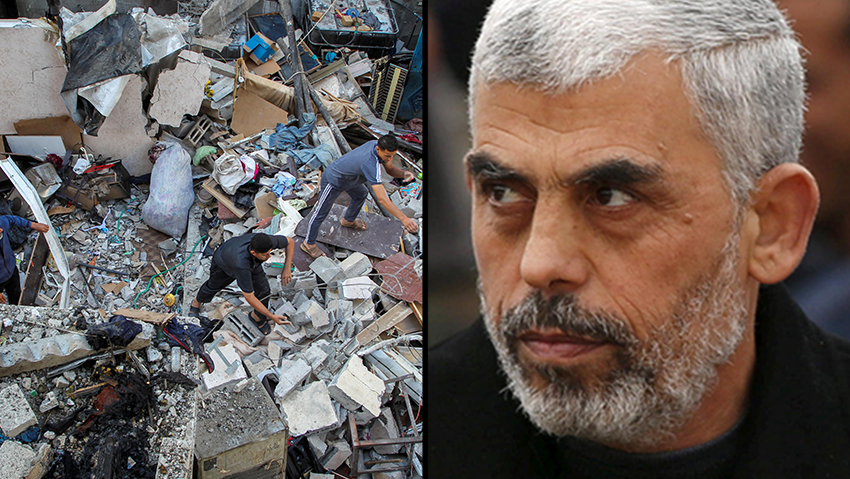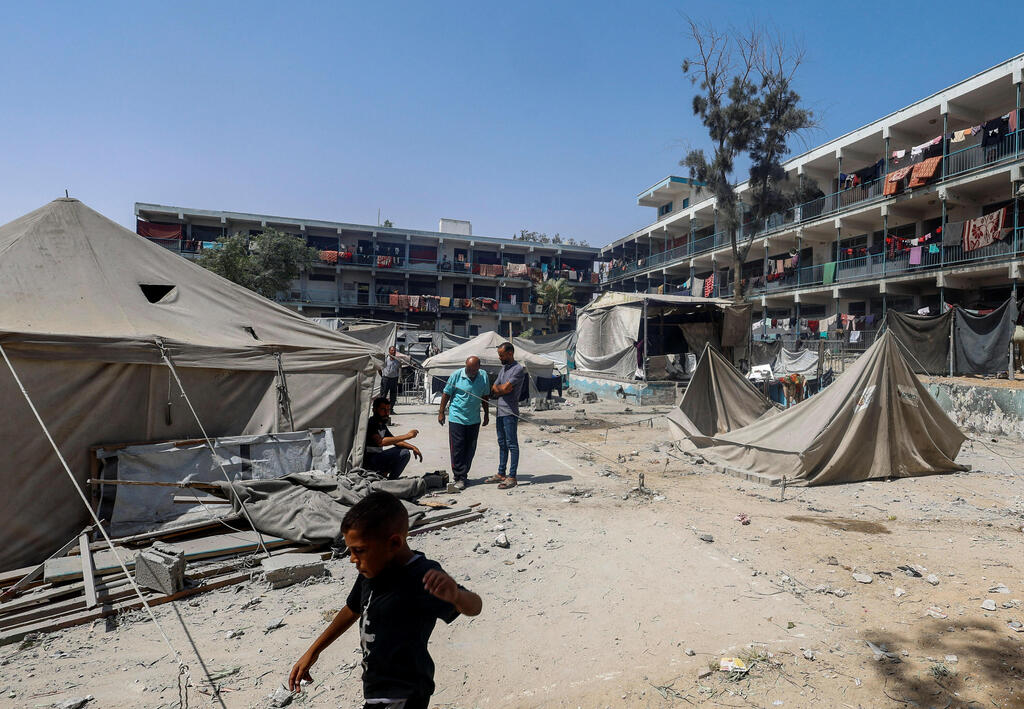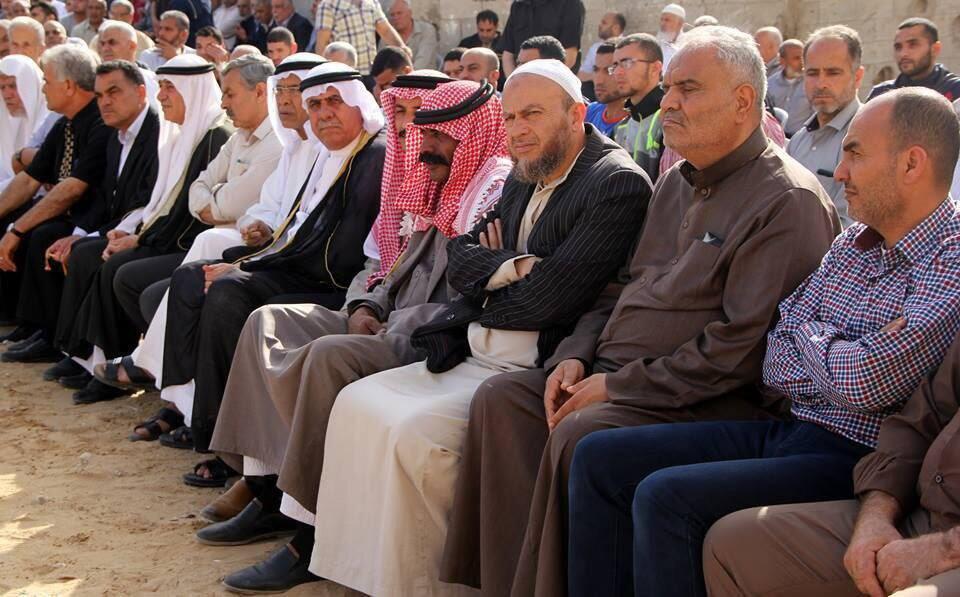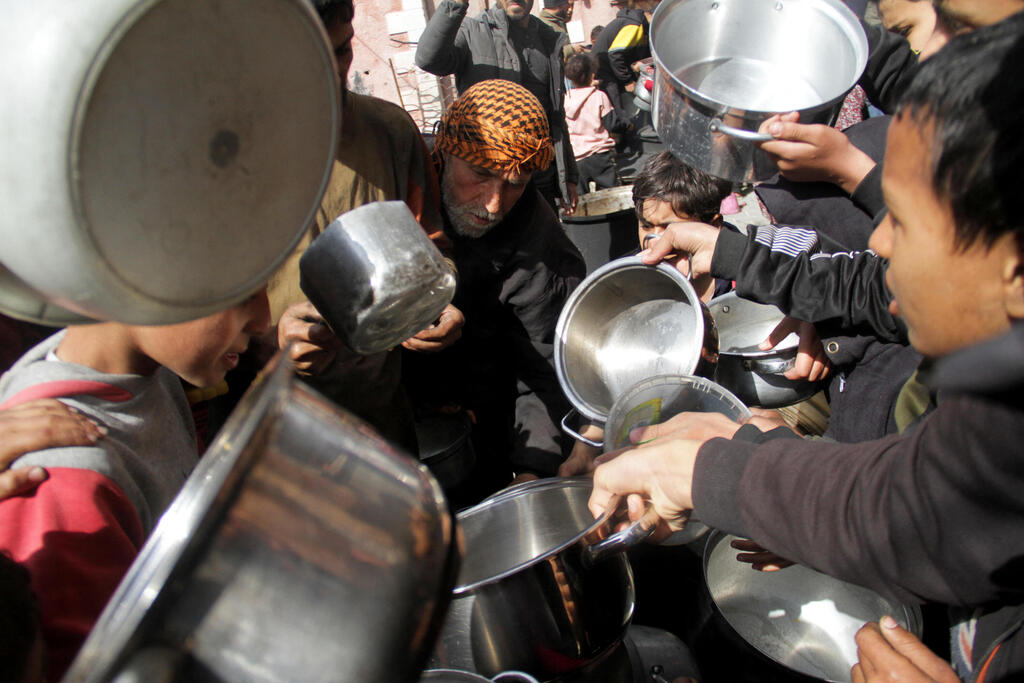Getting your Trinity Audio player ready...
Public criticism of Hamas from Gaza residents is growing, both in the streets and on social media. The BBC tracked the situation in Gaza and spoke with residents who said swearing and cursing against the Hamas leadership is now common in the markets.
One senior Hamas government employee also criticized the attacks on Israel as "a crazy, uncalculated leap."
IDF attacks in Deir al-Balah and Nuseirat, during the rescue of hostages in June
Footage of the chaos amid Israeli strikes outside the Nuseirat hospital during an IDF operation to rescue hostages showed a bloodied resident saying, “I am an academic doctor. I had a good life, but we have a filthy [Hamas] leadership. They got used to our bloodshed, may God curse them! They are scum!”
Before the video ended, he addressed the crowd, “I’m one of you, but you are a cowardly people. We could have avoided this attack!” This video went viral and is not the only one.
According to the report, some drivers of donkey carts have even nicknamed their animals after Hamas leader in Gaza Yahya Sinwar, urging the donkeys forward with shouts of "Yallah, Sinwar!"
Some publicly criticized the organization for hiding hostages near busy markets, as has happened before in Nuseirat, with the Israeli extraction operation and subsequent fighting with Palestinian gunmen leading to large civilian casualties, or for launching rockets from civilian areas.
“People say things like, ‘Hamas has destroyed us’ or even call on God to take their lives,” one man said. “They ask what the 7 October attacks were for - some say they were a gift to Israel.”
Some are even urging their leaders to agree to a cease-fire with Israel.
Despite the growing criticism, some remain fiercely loyal to Hamas, though after years of oppressive control, they may be afraid to admit it. One such individual, a Hamas government employee, asked the BBC to conceal his identity. “I know from my work with the Hamas government that it prepared well for the attack militarily, but it neglected the home front,” he said.
“They did not build any safe shelters for people, they did not reserve enough food, fuel and medical supplies. If my family and I survive this war, I will leave Gaza, the first chance I get.”
There was opposition to Hamas within the Gaza Strip even before the war, though much of it remained hidden for fear of retaliation from the terrorist organization. The last time elections were held in Gaza in 2006, some residents voted for a party other than Hamas. A year later, Hamas violently ejected Palestinian Authority forces from Gaza, leading to a bitter split with the rival Fatah movement and taking control of the entire coastal enclave.
Ameen Abed, a political activist who claimed to have been arrested multiple times for speaking out against Hamas before the war, told the BBC that nine months into the war, resistance to the terrorist organization has become more common.
“In Gaza, most people criticize what Hamas has done,” he said. “They see children living in tents, and insulting their leaders has become routine. But it has a lot of support among those outside Gaza’s border, who are sitting under air conditioners in their comfortable homes, who have not lost a child, a home, a future, a leg.”
The BBC noted that despair and war have eroded social structures in Gaza, and Hamas' control is waning. Most of Gaza's population is displaced, frequently moving between temporary shelters. Law and order have broken down in many areas, partly due to Israel's policy of targeting all Hamas forces in Gaza, including the community police responsible for street crime.
As Hamas' control waned, crime gangs flourished, looting entire neighborhoods and aid convoys. Consequently, private security companies, some managed by powerful local clans, have emerged.
A staff member of an aid organization operating in Gaza described the situation in the territory to the BBC as "absolute chaos at street level" and "a state of anarchy." He said that civil order had entirely collapsed, blaming Israeli policies for this breakdown.
While Prime Minister Benjamin Netanyahu continues to urge the war's continuation until Hamas' military and governmental capabilities are destroyed, aid agency workers in both northern and southern Gaza report that their activities are closely monitored by local Hamas officials. There are even videos circulating of unofficial Hamas security forces beating those caught looting.
A source told the BBC that dozens of people were killed by Hamas in bloody score-settling with local clans after IDF forces withdrew from one area.
While fear of criticizing Hamas leaders may have diminished, it has not disappeared. The BBC noted that it is difficult to gauge the extent of opposition to the terrorist organization among Gaza's residents.
Jihad Talab, a 26-year-old Gazan, still strongly supports Hamas. “We must support [Hamas] because it’s the one working on the ground, the one who understands the battle - not you or I,” he told the BBC. “Empty accusations only serve the occupation [Israel]. We’ll support it until our last breath.”
Such statements, in contrast to what the BBC heard from some other residents, could corroborate a recent public opinion poll conducted last month, which examined the Palestinian scene in the West Bank and Gaza Strip.
The poll found that half of Gaza's residents expect Hamas to emerge victorious and return to control the territory after the war. Ultimately, from the destruction caused by Hamas' attack, a new battle is emerging in Gaza: a struggle for control over public opinion among Gazans.









